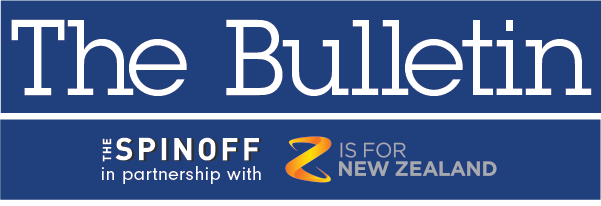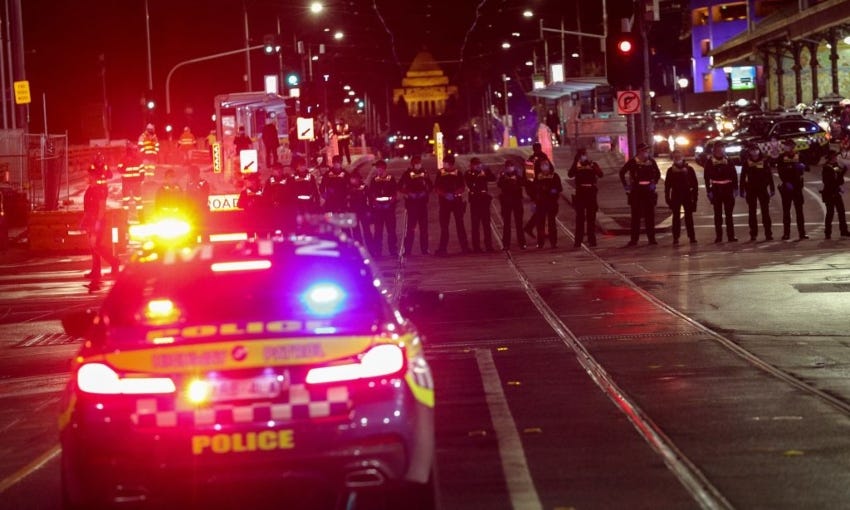Covid in Australia worse every day
New South Wales is recording record cases, Victoria is in lockdown, people are dying and an economic crunch is coming
Good morning and welcome to The Bulletin for Friday 6 August, by Alex Braae for The Spinoff. Presented in partnership with Z Energy.
In today’s edition: Covid in Australia worse every day, it turns out the co-founder of Google has NZ residency, and conversion therapy ban passes first reading.
Image: Police in Melbourne forming a roadblock against anti-lockdown protesters (Getty Images)
Despite the measures taken against spread, the Covid situation in Australia is getting worse by the day. The Sydney Morning Herald reports a record 262 new cases were recorded in the state of New South Wales yesterday, continuing an upwards trend that has been taking place for almost a month. As well as that, five deaths were announced.
Fears are mounting about the "long Covid" effects this outbreak will have, with an increasing proportion of new cases among those under 40. Among the deaths in this outbreak has been a 27 year old man who was unvaccinated – as The Monthly Today reports, that was because of Australia's slow vaccine rollout. The pace of Australia's rollout is roughly comparable to that of New Zealand, so it should be taken as a huge warning about the risks of a delta outbreak.
The state of Victoria will also go into a week-long lockdown, after eight cases of the delta variant were reported. Like in Sydney, the ABC reports the announcement was immediately met by hundreds of people protesting, with 15 arrests made. It's not clear whether the protests in Sydney have contributed to the current spike in cases, though it was widely speculated at the time that it could. This lockdown will be the sixth faced by Melbourne.
In economic terms, the response to this outbreak has been shaky and best, and could be disastrous at worst. The SMH reports a huge swathe of jobs in greater Sydney have been lost as a result of the lockdowns, and given the city is Australia's most important economic centre, that could have wider implications for the country. The state was very slow to move when the delta outbreak was beginning, and as a result (how many times have we now seen this around the world?) is now having to lock down harder for longer. Two writers on Crikey (paywalled) argue that any recession that follows should be put at the feet of PM Scott Morrison and NSW Premier Gladys Berejiklian.
An odd story broke yesterday morning about Google co-founder Larry Page having been in New Zealand so his son could have medical treatment. Stuff's George Block chased down how that was possible with the closed border, and after initial official denials, it later emerged that the 6th richest person on the planet holds New Zealand permanent residency. Many other details of the story remain a mystery, including whether Page spent two weeks in MIQ. On the subject, I thought this was an interesting column from the NZ Herald's (paywalled) Chris Keall, who noted the multi-billionaire's family probably benefited from our free healthcare system.
It does slightly stick in my craw that Page has benefited from our infrastructure at a time when his company has moved quite assertively to minimise its tax exposure in New Zealand (Page stepped down as chief executive of Google's corporate parent Alphabet in 2019, but is still a director and a major shareholder with around US$120 billion worth of stock).
The conversion therapy ban passed a first reading through parliament yesterday, with all parties except National voting in favour, reports Justin Giovannetti. The debate and vote took place amid acrimonious scenes in the house, and on social media for those watching along. National MPs insisted the did support banning conversion therapy in principle, but not this bill, while Act chose to vote for the bill to send it to select committee where they could work their concerns out.
Every dollar our members contribute directly funds our editorial team and is devoted to ensuring we do more. Support the team. Donate today!
Port workers in Tauranga have been left unsettled and concerned after a Covid scare – though on the bright side, it was just a scare and not a case. Alisha Evans at Sun Live reports they were contacted by a worker who had concerns about how the situation was handled, particularly the "very limited information" given to workers. After work on the ship was abruptly shut down on Wednesday night, agencies have since given the all-clear for work to continue.
An increasing number of firms are closing or defaulting, with many industries seeing struggles with cash-flow, reports Anuja Nadkarni for Newsroom. The story also covers businesses going into liquidation, linked to an IRD crackdown on non-payment of tax. The sectors seeing significant numbers of closures include tourism, retail and construction.
There's been a lot of commentary recently about how wage inflation and low unemployment means it's time for interest rates to go up. But that is just one orthodox perspective, coming at a time when economic orthodoxy... well, it hasn't necessarily proven to be the most solid of sciences. A strongly argued counterview has come from Bernard Hickey in his Dawn Chorus newsletter, who has done a deep dive on whether now is really the right time for an interest rate hike, or if it could end up causing unintended economic damage.
This winter has been the warmest on record over June and July, reports One News. NIWA data, which has been collected since 1909, shows that temperatures have been way above the long term average. It is also entirely expected and in keeping with what we know about climate change, and it's basically certain new records will be set over the coming decade.
Got some feedback about The Bulletin, or anything in the news?
Get in touch with me at thebulletin@thespinoff.co.nz
Right now on The Spinoff: Bernard Hickey writes about the limbo facing those locked out of the country. Justin Latif reports on efforts in South Auckland to prevent gang violence. Ling Yee Wong writes about what New Zealand can learn from hate speech laws in England. Ben McKay critiques the many pictures of politicians getting their Covid jabs. Rachel Kerr reviews The Justice of Bunny King, finding it engrossing and tragic. And Madeleine Chapman marks the remarkable Valerie Adams, who can quite fairly be considered New Zealand's greatest ever athlete.
It turns out there's a lot I did not previously know about tuna. So for a feature today, a highly informative piece about basically everything there is to know not only about the fish themselves, but how they're caught, by whom, and to what end. Here's an excerpt from the piece by Kate Evans for NZ Geo – note, this excerpt is actually from a sidebar rather than the feature itself.
Tuna caught in the Pacific by purse-seining is less likely to be implicated in human-rights violations, illegal fishing or misreporting than high-seas longliners. Purse-seiners work closer to shore for shorter periods, and all purse-seiners have independent fisheries observers on board. (Distant-water longline fleets have been required by the Western and Central Pacific Fisheries Commission to have observers on five per cent of boats since 2007, but they’ve never met that target, says Cook.)
What about southern bluefin? “If you believe in conservation, it would be reasonable not to eat bluefin, and confine your eating of tuna to skipjack and albacore—the ones that are canned,” says Bruce Collette. But due to southern bluefin’s continuing recovery, Cook believes it is “probably okay to eat now”. Aside from bycatch, the fishery is comparatively well managed.
Easily the strangest Olympics of the modern era will shortly come to a close. It was pulled off without any total Covid catastrophes for the athletes, though Reuters reports cases in Tokyo are currently at record levels – a heavy price to pay for a public that wasn't that keen on it in the first place. I thought this opinion piece on the Guardian raised an excellent point about what the Olympics has become in a more general sense, the horrific damage it does to host cities, and whether it is time for it to be stopped forever – much as I love seeing two weeks of uninterrupted sporting excellence, I tend to agree.
That's it for The Bulletin. If you want to support the work we do at The Spinoff, please check out our membership programme.








I think part of the issue is that we expect The Olympics to be hosted by one city and confined to a small-ish geographic area. How about we let a whole country host it and have the sports (and therefore Olympians) spread everywhere. This would mean that the Opening and Closing Ceremonies would likely need to have a new format, but in the age of technology, this should be workable.